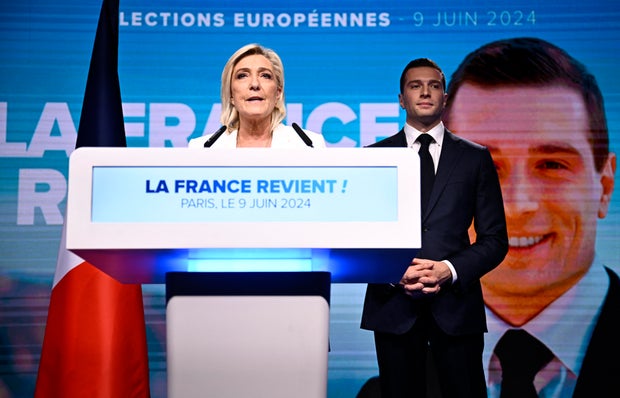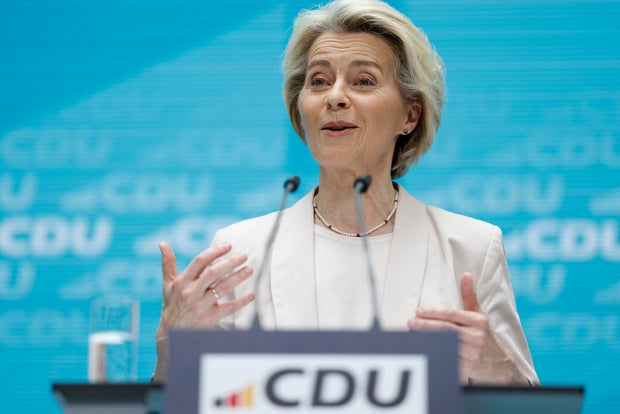After four days of voting, with more than 400 million people eligible in 27 countries, European voters have pulled the bloc’s 720-seat parliament further to the right than ever before. The European Parliament, over the next five years, will now have a record number of far-right lawmakers. Far-right parties made gains in Europe’s three main economies – Germany, France and Italy – with gains from politicians who campaigned against immigration, against support for Ukraine and against climate policy.
France
For France, the far-right National Rally party won the highest number of votes to represent the republic in the European Parliament, more than 31% of all French votes cast – more than double the almost 14% of votes for supported centrist candidates by French President Emmanuel Macron.
Macron dissolved the French Parliament almost immediately and called for shock, early elections. The first round of voting is scheduled for June 30th, with the second round scheduled for July 7th.
“I give you back the choice for the future of our Parliament,” a grim-faced Macron said on a national broadcast. “The rise of nationalists, of demagogues, is a danger for our nation, but also for our Europe, for France’s place in Europe and in the world.”
His surprising political gamble may be intended to shock French voters into not shifting further to the right, but if he loses more power, it increases the chance that Marine Le Pen’s National Rally will win, with rumors of her telegenic 28-year-old party president Jordan Bardella. becoming prime minister and Le Pen possibly ascending to the presidency after Macron in 2027.
JULIEN DE ROSA/AFP via Getty Images
Italy
For Italy, Prime Minister Giorgia Meloni’s party – the Brothers of Italy, with its neo-fascist roots – also obtained the highest number of votes. Italy’s almost 29% vote for the European Parliament more than quadrupled its vote share compared to five years ago. Italy’s center-left opposition Democratic Party came in second with 24% of the vote.
“The Italians are giving us a loud and clear message to get on with our work,” Meloni told Italian radio.
The prime minister, however, has recently tempered her international image, abandoned anti-EU rhetoric and portrayed herself as a bridge between her own arch-conservatives and Europe’s moderate center-right. Her party’s strong performance in the European Parliament elections could now increase Italy’s power in deciding who it will support as the next president of the European Commission, currently occupied by the center-right Ursula von der Leyen. Meloni says she hasn’t yet decided whether she would be Von der Leyen again.
Germany
For Germany, the far-right Alternative for Germany party finished second, with almost 16% of the vote – despite a series of self-inflicted scandals linked to Nazi propaganda, Chinese espionage and Russian bribery among its ranks. leaders and members. German Chancellor Olaf Scholz’s party, the Social Democrats, which has been a pillar of German politics for more than five decades, polled less than 14%, resulting in the worst national referendum result in more than 100 years and putting into question whether his coalition government can survive.
Slovakia
But not all nationalist parties prevailed. Contrary to opinion polls, the Prime Minister of Slovakia, Roberto Fico, now faces a surprising defeat after his left-wing nationalist party, Smer-SD, came second, with almost 25% of the votes, to the liberal and pro-Western party of Progressive Slovakia, which won almost 28% of the votes. wishes. One of Smer’s main political platforms has been his refusal to send weapons to Ukraine in its war against Russia.
I am narrowly survived an assassination attempt after being shot four times by a gunman on May 15. Opinion polls revealed which party was favored to win, implying that the prime minister’s near death may have generated support and a vote of solidarity.
The center of Europe remains – for now
Admittedly, the far-right parties’ seat gains in the European Parliament are not huge in terms of absolute numbers — two seats here, five seats there in a 720-seat parliament — but they are notable because they illustrate the advance of acceptance of right-wing, once-fringe policies into what was once a traditionally liberal European mindset, as Europe’s centrist parties tried to stay relevant and maintain power. And it could serve as a roadmap for Europe’s right to continue to win future elections and perhaps, ultimately, gain the levers of power to control Europe’s governance.
But just as the far-right candidates celebrated, so did the President of the European Commission, Ursula von der Leyden. His center-right European People’s Party actually gained seats to maintain its position as the largest bloc in the European Parliament.
ODD ANDERSEN/AFP via Getty Images
“The center is holding on, but it is also true that the extremes of the left and right have gained support,” said von der Leyen in Brussels, headquarters of the European Union.
To win a second five-year term, she needs the support of a majority of EU national leaders and a working majority in the European Parliament. She began working on forming a grand coalition to govern.
“We may differ on individual points,” she said, calling out centrist members of parliament, “but we all have an interest in stability and we all want a strong and effective Europe.”
bol co
jogo de terror online
novela sbt ao vivo
wishlist
musica terra seca
taça png


























